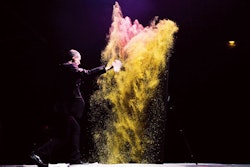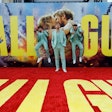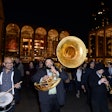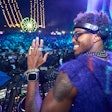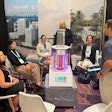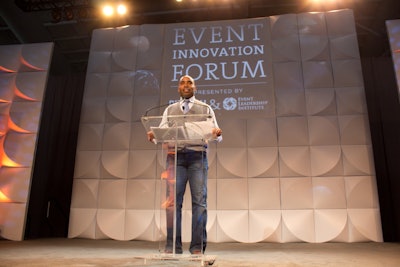
On October 30, BizBash and the Event Leadership Institute hosted the second Event Innovation Forum as part of the BizBash IdeaFest New York at the Jacob K. Javits Convention Center. The sold-out, TED-style conference brought eight speakers from a variety of backgrounds to the stage, including Michael Trainer, executive producer of the Global Citizen Festival; Melanie Altarescu, executive director of integrated marketing at The New Yorker; and former New York Giants running back and the co-founder of Thuzio, Tiki Barber.
Here's a roundup of their tips for building a brand, using social media as an advantage, and more.
1. Focus on the message first
Richard Steinau, vice president of AV Concepts, is best known for bringing the Tupac hologram to the Coachella Valley Music and Arts Festival in 2012. Despite the massive audiovisual feat—the hologram took two years to create, due to the challenging environment of a desert venue—he believes it's important to focus on the message first and the technology and creative second. His company wanted to honor Tupac's legacy and to create something meaningful for the late rapper's family, friends, and fans.
Likewise, Bryan Rafanelli, president and C.E.O. of Rafanelli Events, spoke about creating relevance in event design. "It's our obligation to create meaning in design in every event that we do," he said. The designer and producer is a fan of taking a basic location and bringing in decor that enforces the event's message.
Communicating the mission of his organization and its partners was crucial for Michael Trainer, the U.S. country director of the Global Poverty Project, when he began generating support for the first Global Citizen Festival—a massive, free concert in Central Park that raises money to end global poverty—back in 2012. He told partners and sponsors, "We want to create a platform for you to share your message."
2. Build buzz through social media ...
When the Tupac hologram hit Coachella, Steinau was eagerly waiting for the reaction to reach social media. What he didn't expect was that feedback would be delayed—everyone was so focused on recording the moment that no one was tweeting. But after a few minutes, tweets came rolling in, and Steinau was thrilled. "We wanted the audience to not just engage; we wanted them to share," he said.
Melanie Altarescu of The New Yorker also touched on how social media sharing has changed the way planners are approaching events. "Smartphones have made events more important," she said. Whereas it used to be solely about the live experience in the room, it's now necessary to focus on the social media buzz and the content that lives outside the event. Jeff Boedges, the co-owner of SoHo Experiential, summarized the impact of the multitude of platforms available for sharing comments, photos, and video: "We're no longer keeping up with the Joneses; we're keeping up with what the Joneses are doing."
3. … and through recognizable names
Celebrities at events was another focal point of the forum. Trainer—whose Global Citizen Festival drew musicians such as Stevie Wonder, Alicia Keys, and John Mayer this year—said the performers helped build trust and emotional response for his brand. Tiki Barber, whose company Thuzio books athletes for events and fan experiences, also discussed the response and buzz that a celebrity can generate. He mentioned that this can be just as effective with local celebrities who are not necessarily A-list, which is often a less expensive option.
Boedges said that recognizable names don't need to be famous to be effective: they can be "super fans." These are friends and neighbors who recommend their favorite brands to peers. Boedges presented statistics that showed personal recommendations are the number-one influencer in buying decisions. "Super fans are as effective if not more effective than celebrities in growing our brands," he said.
4. Use limitations to your advantage
"I love limitations," said Rafanelli. "The word 'no' is exciting. It's a challenge. You have an obligation to push the limit." Trainer has a similar mentality, and spoke to the constraints of hosting a concert in Central Park, where it's illegal to sell tickets to an event held in a public space. He used this restriction to create a lottery system in which consumers could earn points by watching videos about the Global Poverty Project's mission, sharing links, signing a petition, and more. "We wanted to ask people for their action and their voice," he said. The free event resulted in $1.3 billion in pledged donations.
5. Make a memory
Several speakers mentioned that memorable experiences give brands value. Barber argued that an interactive experience with an athlete is more valuable than the old steak dinner. Thom Casadonte, head of global events for Bloomberg, talked about how the five senses are so tied to memory, and they should be engaged in unexpected ways at events and meetings—even in traditionally conventional environments such as financial conferences.
6. Be transparent—with employees and donors
Tamara Mendelsohn, vice president of marketing for Eventbrite, said that 64 percent of fund-raiser organizers who met sales goals looked at ticket sales and analytics daily. She argued that making sure employees understand the data—when there are ticket-sale spikes, when customers are having problems, etc.—makes a big difference. On the flip side, for Trainer, it's important to keep attendees in the loop by being clear about the results of their donations.
7. Always have a plan B
Rafanelli explained that he tries to present three ideas, of varying budgets, to every client. Similarly, Altarescu spoke extensively about the importance of having a full arsenal of ideas. Her tactic is to constantly research new technological developments and ideas, and cultivate relationships with vendors, to allow her to keep coming up with creative concepts. "Stay proactive so when clients come to you, you have what they need."





